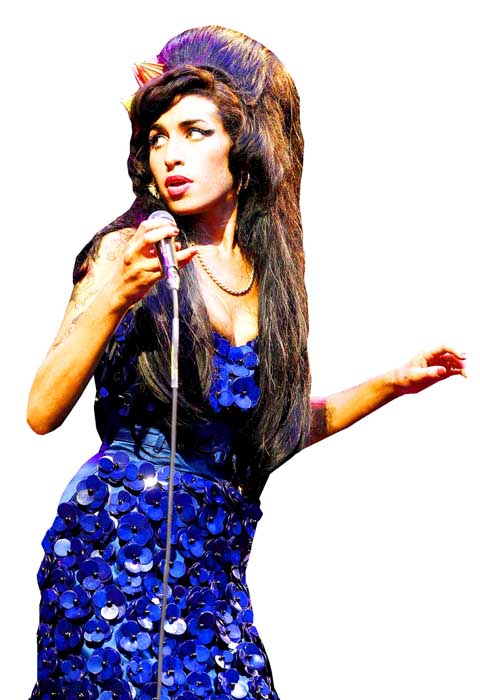Even for Amy Winehouse, it was a dramatic chain of events: After fainting and being rushed to a hospital, Winehouse's father said her crack and cigarette smoking had so damaged her lungs, she was risking emphysema and death if she didn't clean up.
Yet Winehouse - famous for her rebellious anthem Rehab - was photographed with a cigarette dangling from her lips as she left the hospital.
It was a potent symbol of how Winehouse's troubles have multiplied since February, when she was enjoying the triumph of her young career.

PHOTO: EPA
There she was, before a worldwide audience, surrounded by family after winning a record-tying five Grammys for her album Back to Black. True, the 23-year-old Brit couldn't make it to the Los Angeles show - she had finally entered a rehabilitation clinic. But the Grammys were still a brilliant achievement after months of reported drug use, attempts at rehab, canceled performances and erratic behavior.
Immediately after the Feb. 10 ceremony, there was talk of relaunching her US tour. "There was a sense that maybe she was going to turn it around and she was going to get it together and it was going to be a great feel-good story," said veteran music journalist Alan Light.
"We all have a walk in life," legendary singer Chaka Khan, herself a past user of drugs, said backstage after Winehouse's wins.
"We have hard and difficult times and going through that chaos often leads to clarity." But since being released from the hospital this week, the only thing that's gotten clearer is how deeply troubled Winehouse remains. Police have investigated her for an alleged assault and for drug use; she's been photographed looking particularly wan and disheveled, with pockmarks on her face and marks on her arms; videotapes have been released showing disturbing behavior, including one where she sang a song full of racial slurs. Her father was quoted as saying she had only "70 percent lung capacity." While drugs and music have a long history together, Winehouse's problems are remarkable given their prominence in a relatively short career (she made her UK debut in 2003 and her US debut last year).
"It's definitely been a rough time for her," said Rick Krim, an executive vice president at VH1. The channel broadcast taped highlights of Friday's birthday concert in London for Nelson Mandela at which Winehouse performed.
Before the concert, it wasn't clear which Winehouse would show up - the sultry, forceful singer or the bumbling, unfocused person who arrived an hour late to a June concert in Portugal. That brief set was marked by her croaking voice, highlighting the damage that smoking can cause to any singer's instrument.
Performing in front of 80,000 fans at the concert for Mandela, Winehouse sang for about an hour.
After her stunning Grammy wins back in February, while there were lots of good wishes for Winehouse, not everyone thought The Recording Academy's coronation was a positive moment. Past Grammy winner Natalie Cole - who had battled drug addiction years ago - was quoted as saying: "I don't think she deserved it ... I think she needs to get her life together first, and then get the awards later." Noted Light: "It certainly doesn't look like the Grammys helped in any way for her to get cleaned up or figure it out at all." But he cautioned against tying up an artist's personal conduct with getting awards, a notion shared by Recording Academy President Neil Portnow.
"Creativity and great artistry is really the benchmark of our evaluation and for our membership's judgment of their fellow artist's musical work," he said.
"We're always hopeful that a positive experience in the Grammy process is beneficial and uplifting for artists, on many levels," he added, "but we also know the stark realities of the difficulties of addiction and addiction recovery, and I think it would be naive for anyone to think that one event, even as much as a milestone for what it was, would erase those elements and circumstances that lead to those kind of difficulties in the first place." Winehouse, born to a pharmacist mother and taxi-driver father, grew up in the London suburbs and attended performing arts schools.
She found critical and commercial success with the release of her first album, the jazzy Frank, when she was just 20 years old.
But even then her alleged drug use was becoming fodder for London tabloids.
Charles Sophy, an addiction specialist who works with celebrity clients, said that shining moments can often cause a relapse: "The trigger can be the emotional discomfort of things being happy ... it becomes that uncomfortable self-sabotoge where they don't know how to deal with something so wonderful and they get scared." When Winehouse performed at the Grammys from London via satellite, taking a respite from rehab, some wondered whether that distraction was wise for someone battling a serious addiction. Now that she is attempting to resume performing, the question remains.
But Sophy said it could be a boost for Winehouse to do something that reaffirms a positive aspect of her life: "Anybody building on their strengths is the best thing to do." In addition, Krim believes Winehouse's management and record label have her best interests in mind: "If they're going to have her perform on [the Mandela show], I think the people around her feel she's ready to do it."
Winehouse may have been ready for Friday's performance, but doubts linger about when - or if - she's ready to resume her career. She had been working in the studio but reportedly stopped even before her recent hospitalization: Producer Mark Ronson, who won a Grammy for his work with the singer, recently said she wasn't "ready to record any music." Meanwhile, her near-tragic personal life is keeping her in the headlines. If her troubles remain, the public may lose interest in that part of her life, too.
"This is very early in a career to have now to deal with all of this stuff," said Light, pointing out celebrities who have had monumental crashes - Michael Jackson, Whitney Houston and even Britney Spears - were in the public eye for years before their downturns.
"Once you've been a train wreck longer than you've been the pop star," he said, "I don't know how long people really care."

Taiwanese chip-making giant Taiwan Semiconductor Manufacturing Co (TSMC) plans to invest a whopping US$100 billion in the US, after US President Donald Trump threatened to slap tariffs on overseas-made chips. TSMC is the world’s biggest maker of the critical technology that has become the lifeblood of the global economy. This week’s announcement takes the total amount TSMC has pledged to invest in the US to US$165 billion, which the company says is the “largest single foreign direct investment in US history.” It follows Trump’s accusations that Taiwan stole the US chip industry and his threats to impose tariffs of up to 100 percent

On a hillside overlooking Taichung are the remains of a village that never was. Half-formed houses abandoned by investors are slowly succumbing to the elements. Empty, save for the occasional explorer. Taiwan is full of these places. Factories, malls, hospitals, amusement parks, breweries, housing — all facing an unplanned but inevitable obsolescence. Urbex, short for urban exploration, is the practice of exploring and often photographing abandoned and derelict buildings. Many urban explorers choose not to disclose the locations of the sites, as a way of preserving the structures and preventing vandalism or looting. For artist and professor at NTNU and Taipei

March 10 to March 16 Although it failed to become popular, March of the Black Cats (烏貓進行曲) was the first Taiwanese record to have “pop song” printed on the label. Released in March 1929 under Eagle Records, a subsidiary of the Japanese-owned Columbia Records, the Hoklo (commonly known as Taiwanese) lyrics followed the traditional seven characters per verse of Taiwanese opera, but the instrumentation was Western, performed by Eagle’s in-house orchestra. The singer was entertainer Chiu-chan (秋蟾). In fact, a cover of a Xiamen folk song by Chiu-chan released around the same time, Plum Widow Missing Her Husband (雪梅思君), enjoyed more

Last week Elbridge Colby, US President Donald Trump’s nominee for under secretary of defense for policy, a key advisory position, said in his Senate confirmation hearing that Taiwan defense spending should be 10 percent of GDP “at least something in that ballpark, really focused on their defense.” He added: “So we need to properly incentivize them.” Much commentary focused on the 10 percent figure, and rightly so. Colby is not wrong in one respect — Taiwan does need to spend more. But the steady escalation in the proportion of GDP from 3 percent to 5 percent to 10 percent that advocates